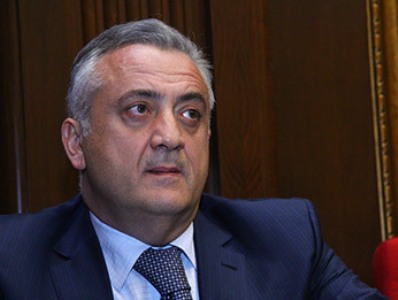


ArmInfo. High expectations for the world economy growth rates and geopolitical situation in the region create more and more challenges for the country's financial system, Chairman of the Central Bank of Armenia (CBA) Arthur Javadyan expressed this opinion in the parliament today, answering to the MPs questions about the level of stability of the country's financial system.
According to Javadyan the consequences of the financial-economic crisis of 2008-2009 have not been overcome yet and the factor of geopolitical tension is another challenge, which makes the CBA to take preventive measures for maintaining the stability of the financial and particularly, the banking system. According to the CBA Chairman one of such measures is the decision of 2014 to raise the requirement for the banks' minimal capital to 30 bln AMD by Jan 1 2017. "We were harshly criticized for this decision but the reality has shown that it was quite justified. As of today 9 banks have already successfully refilled their capitals, some of them by merging and I have no doubts that by the end of this year all the commercial banks of the country will meet this challenge", Javadyan stressed.
According to his forecast the economic activity in Armenia will grow, financial system will respond to this by attracting new resources from abroad and stable ensuring of high liquidity, however it will not manage to overcome objective difficulties related to reduction of lending market. In Javadyan's opinion the situation on the credit market is related to the fall of the population's consumption because of drop of private transfers and reduction of aggregate demand. The borrowers have suffered high level of debt burden and creditors in their turn conduct conservative credit policy justified in such situation. As a result of these difficulties the share of non-performing loans grows in the banking sector and this process will continue. That is why the Chairman of CBA thinks that the requirement to increase the capital was aimed at creating a safety cushion for the current situation. Javadyan stressed that the banking sector of Armenia is reliable and brought as an example the policy of HSBC international holding, which has closed its offices an branches in all the post soviet countries and even in Turkey, however decided not to leave Armenia.
At the same time Javadyan emphasized that judging from the data of the first months of this year the rates of Armenia's economic growth most likely will be high on the level 3-3.2% and will exceed the initial forecasts also due to further growth of industry in the agricultural field and agro business. According to him due to absence of inflation expectations CBA will further stimulate economic activity in the county by gradually reducing the key interest rate and other measures of monetary policy.
To recall, Central Bank of Armenia forecasts slackening of economy growth in 2016 to 1.5-2.6% versus previously forecasted 1.6-2.7%. This forecast is given in the monetary policy program of the CBA for Q1 2016. However starting from 2017 the CBA expects acceleration of economy growth rates due to efficient implementation of the governmental program on stimulating the investments and export, gradual improvement of external economic situation and influence of the conducted structural reforms, as a result of which the economy growth may reach 3-4.5% by the end of 2017. To note the inflow of transfers of physical entities to Armenia dropped by 24% in 2015 to 1.6 bln USD, which influenced the level of incomes of households and lead to drop of aggregate demand by 8-10% according to various estimates. Since November 2015 CBA has several times reduced the refinancing rate from 10.25% to 7.75%.